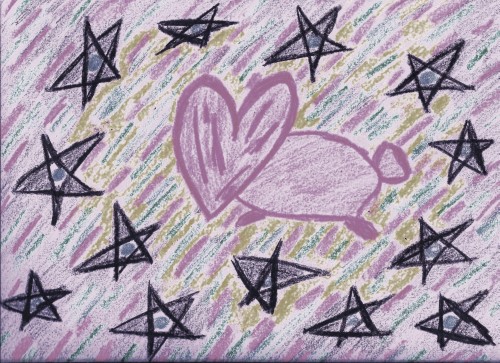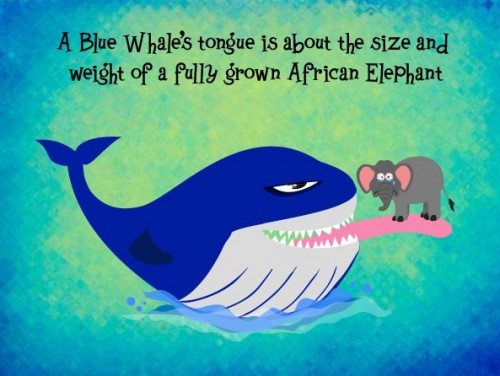The Hunger Games % Academic Conference
A tiny bit ago, like in February, Carina Finn, the girl author of Lemonworld, published a list of the panels that were to be held at The Hunger Games % Academic Conference.
The conference was kind of (though not really) supposed to take place soon after, but due to incidents involving peanut butter, Sean Cody, and tea parties, the conference kept incurring delays.
Finally, on a cool summer night, the primary participants of The Hunger Games % Academic Conference — New York City Poetry Festival princess Stephanie Berger, Carina, and me — gathered at a sharply secret location, and the conference, after so many months, commenced.
Before the first panel was to begin, controversy came. I noticed that the then title of our conference, The Hungers Games Academic Conference, looked sort of weird, like Barack Obama’s birth certificate (which I still haven’t had the chance to see, by the way). I suggested that we add percentage symbols before the “The” and after “Games.” Carina concurred that The Hunger Games Academic Conference was too plain to be pretty, but she deemed that two percentage symbols was a surfeit, and declared that there should only be one, and that one should come after the “Games.” So that’s how The Hunger Games Academic Conference became The Hunger Games % Academic Conference.
Stephanie, who’d been texting with boys throughout the title alteration, then declared, “We’re off to a good start.” But her cheer was countered right away when a stack of referential texts, including Kate Durbin’s Kept Women, Sianne Ngai’s Our Aesthetic Categories, and an alien anthology of film theory essays, toppled over.
And on that odious note, the first panel — The Hungers Games As a Micro/Macrocosm of the Hungarian Doctor in Celine’s Oeuvre As Interpreted by Kristeva; or, Stephanie Drops Her Port — proceeded with both Stephanie and Carina recalling the specific time when the former dropped her port; both labeled the occurrence “a moment of abjection.”
Carina then touched on the Celine component of the panel by describing both Celine and The Hunger Games as dramatically violent and pastorally lovely.
25 Points: The Great Gatsby Novel, Game, and Movie
1. “In my younger and more vulnerable years,” Nick Carraway from The Great Gatsby starts. The first part of the book revolves around the question, who is Gatsby? But what I always wondered was, who exactly is Nick Carraway?

2. As to the question of Gatsby, I find it interesting that there are so many similarities between Jay Gatsby from The Great Gatsby and Don Draper from Mad Men. Both went to war as poor men without any real place in the world. Both came up with different identities to hide their past. Both fell in love with beautiful women. The main difference was Don got the woman he chased after and became miserable. Gatsby died for a love that didn’t love him all that much and became a symbol of the Lost Generations of the 1920s.

3. F. Scott Fitzgerald also worked at an ad agency during the early part of his career. What would a Mad Men episode written by Fitzgerald have been like?
4. Fitzgerald wrote The Great Gatsby after the failure of his play, The Vegetable. He was deeply in debt and an alcoholic. He hoped Gatsby would become a success. It received mixed reviews and undersold at 20,000 copies when he had hoped for at least 75,000. In modern film terms, it was a box office disappointment. Some critics have suggested a novel about affluence in a time of economic depression would have been less than palatable for readers. By the time Fitzgerald died, The Great Gatsby had sold a total of 25,000 copies. He died believing he was a failure.
5. Bahz Lurhmann’s The Great Gatsby exceeded sales expectations at the box office, bringing in $51.1 million dollars starring millionaires acting as millionaires. READ MORE >
July 16th, 2013 / 12:21 pm
STARK WEEK INTERLUDE: SLampson and the Mermaid
This is what happens when a poet meets a mermaid on Second Life, a 3D world where everyone you see is a real person and every place you visit is built by people just like you.

[19:31] SLampsonSLarkweather: Hail, Hail, the kid can swim!
[19:32] rigar yumsfeld: kid?
[19:32] SLampsonSLarkweather: I scream even more, you’re all here to see me bleed, run down roosters, bees, the buoyancy of already gone, I was just playing
[19:32] SLampsonSLarkweather: FISH OUT OF WATER.
[19:33] rigar yumsfeld: haha
[19:33] SLampsonSLarkweather: So I float. So I kick and scream for no other reason than being born.
[19:33] rigar yumsfeld: haha you could float
[19:34] rigar yumsfeld: :)
[19:35] SLampsonSLarkweather: We whored our pool via free advertising. Paid through the nose. “Above ground” is a term I still don’t understand.
[19:37] rigar yumsfeld: haha yeah
[19:38] SLampsonSLarkweather: We all come out swimming. Not a lifeguard for miles. They called me White Lightning in the stands, but nobody knew my name was Doubled-Over, that I peed my pants simply to stay warm.
[19:38] SLampsonSLarkweather: What can you do?
[19:38] rigar yumsfeld: what you mean?
[19:40] SLampsonSLarkweather: I mean that You believe in words. Their power. Weight.
[19:40] SLampsonSLarkweather: Like some kind of nerd.
[19:40] SLampsonSLarkweather: imagine this as music.
[19:40] SLampsonSLarkweather: dunzo
[19:40] SLampsonSLarkweather: now where to go
[19:41] rigar yumsfeld: idk wtf you are talkign bout
[19:43] SLampsonSLarkweather: clusterfucks aren’t a breakfast cereal.
[19:44] SLampsonSLarkweather: I’m telling you the clouds point to us, too.
[19:49] rigar yumsfeld: sorry im at work
[19:51] SLampsonSLarkweather: Instead of a raise, my job offered to get me a new chair, in the form of one of those giant exercise balls.
[19:53] SLampsonSLarkweather: As if I don’t realize they are actually saving money by buying me a plastic ball for a chair.
[19:53] rigar yumsfeld: I dont need a raise
[19:53] rigar yumsfeld: ^^
[19:55] SLampsonSLarkweather: i can do anything with money.
[19:55] SLampsonSLarkweather: i’ll show you if you give me the money.
[19:55] rigar yumsfeld: lol
[19:57] SLampsonSLarkweather: Have you noticed all the commercials these days are trying to cash in on the economic crisis?
[19:58] rigar yumsfeld: yeah :P
[19:58] rigar yumsfeld: well I better get going
[20:00] SLampsonSLarkweather: I’d love to partake
[20:00] SLampsonSLarkweather: but i’ve got umbrellas and promises to break
[20:01] SLampsonSLarkweather: and miles to go before this roofie wears off.
[19:58] rigar yumsfeld: you are fucking weird man
[Note: This dumb thing was inspired by this broadside from Rye House Press.]
July 16th, 2013 / 4:15 am
STARK WEEK EPISODE #2: “Off the Top Rope” — Matt Bollinger on collaboration with Sampson Starkweather

For Episode Two of STARK WEEK, we hear from Matt Bollinger, who designed and drew the front and back covers of The First Four Books of Sampson Starkweather.
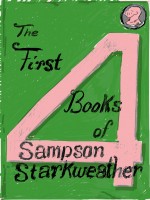

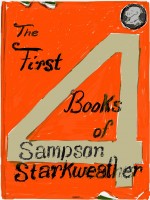 Sampson wrote to me early last December to ask if I would make a cover for his book. “I’m very busy,” I summarily replied but in less summary and more polite terms. Because of a new full-time teaching job and an impending solo exhibition, I felt there was no way I would possibly have the time to make a cover. The next email I received from him came like a sudden summer storm (particularly strange in the final week of a wintering semester) complete with simultaneous heavy raindrops and sunshine. He supplied approximately 43 ideas for the cover, including examples from the history of fantastic poetry covers. Here’s an example:
Sampson wrote to me early last December to ask if I would make a cover for his book. “I’m very busy,” I summarily replied but in less summary and more polite terms. Because of a new full-time teaching job and an impending solo exhibition, I felt there was no way I would possibly have the time to make a cover. The next email I received from him came like a sudden summer storm (particularly strange in the final week of a wintering semester) complete with simultaneous heavy raindrops and sunshine. He supplied approximately 43 ideas for the cover, including examples from the history of fantastic poetry covers. Here’s an example:
“A note about Andre the Giant off the top rope: this is actually an image that doesn’t exist, which is why it’s appealing to me, the unknown, what only lives in the imagination…so to my knowledge, Andre the Giant has never jumped from the top rope, but god, how i longed to see that; (i’ll send you the poem about it), but in my imagination, i love the image of the 7’5 almost 600 pound flying through the air Jimmy-Supafly-Snuka-style, althought i’m thinking the image would only be part of him or his silhouette, or partly his enormous shadow….”
 A few days after the semester ended when I was in rural Illinois staying in the log cabin where my fiancé grew up, I found myself making numerous studies for the cover. It seemed that I was going to design the thing after all. Sampson, like his neck-brace wearing alter ego from the sectional cover of Self Help Poems, is impossible to say “no” to. Of course, I realized that I couldn’t possibly have let this chance go by. I felt too much of a kinship with his poetry. In my painting-collages, I grapple with a similar intersection between memories (possibly misremembered) and the present moment; between romantic hopefulness and a self-conscious criticality that withers nostalgia. Sampson puts it well in Self Help Poems:
A few days after the semester ended when I was in rural Illinois staying in the log cabin where my fiancé grew up, I found myself making numerous studies for the cover. It seemed that I was going to design the thing after all. Sampson, like his neck-brace wearing alter ego from the sectional cover of Self Help Poems, is impossible to say “no” to. Of course, I realized that I couldn’t possibly have let this chance go by. I felt too much of a kinship with his poetry. In my painting-collages, I grapple with a similar intersection between memories (possibly misremembered) and the present moment; between romantic hopefulness and a self-conscious criticality that withers nostalgia. Sampson puts it well in Self Help Poems:
Nintendo always felt more real than life. Simple yet somehow beautiful worlds, constantly breaking down, designed, whether intended or not, as pixilated avatars of hope. Old school video games are perfect precisely because of how unreal they are. They don’t try to teach you anything, except if you see a hammer, you better grab it.
The process of designing the cover was definitely collaborative. In my recent exhibition at Zürcher Studio in New York, I collaborated with a number of poets, Farrah Field, Alina Gregorian, Steven Karl, and Paige Taggart, who supplied texts for collages I made that depicted notebooks (Dan Magers handled the editing process). This project readied me for the onslaught of fantastic ideas that Sampson and I power-spiked back and forth (not unlike a twisted game of dodge ball where the only defense against the red rubber ball hurtling at face-bash speed is to slam it with your best haymaker).
When developing the images for the front and back covers, Sampson and I discussed Andre the Giant, Louis Zukofsky, “guerrilla underground hand-drawn poetry press style”, LARPing, Nintendo and Mickey Rourke among other things. Sampson had become obsessed with both the coat of arms and a large number 4 modeled after the “A” on Zukofsky’s famous cover. While we tried out a number of variations (see below), we went with the big 4 on the front and the coat of arms on the back.

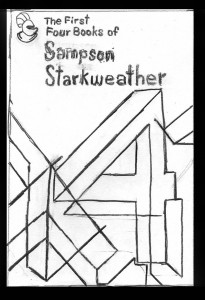

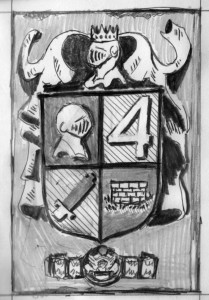
 I had the idea that the coat of arms should spawn from the inner selves of the various personas in his books and arrived at the hobo-TV-fire, the well (Sampson’s idea), the butterfly, and the grabbable hammer mentioned above. We hoped that his cover would resemble an older generation of much coveted books, the sort grabbed hungrily and pressed to the chest in basement bookstores or, more likely, found wrapped in a banana leaf on the shore of a distant island, the same far-away shore where you might find yourself 300 years in the future founding a religion who worships that sacred number: 4.
I had the idea that the coat of arms should spawn from the inner selves of the various personas in his books and arrived at the hobo-TV-fire, the well (Sampson’s idea), the butterfly, and the grabbable hammer mentioned above. We hoped that his cover would resemble an older generation of much coveted books, the sort grabbed hungrily and pressed to the chest in basement bookstores or, more likely, found wrapped in a banana leaf on the shore of a distant island, the same far-away shore where you might find yourself 300 years in the future founding a religion who worships that sacred number: 4.
Matt Bollinger is an artist who lives in Peekskill, NY. He has exhibited extensively in the U.S. and France. In March 2013, he had his most recent solo show, Bed on the Floor, at Zürcher Studio in NYC. His work has appeared in the New Yorker and has been written about in Le Monde, Elephant Magazine, Anthem Magazine, and elsewhere. He is represented by Zürcher Studio, New York, NY. www.mattbollinger.com
STARK WEEK EPISODE 1: “The redonkulous and the sublime” — An interview with Sampson Starkweather
 WEEKS: A lot can kill you in a week. Even more can eat you at your weakness. A whole week of hair growth depends on, uh, genetics? Weeks contain a finite series of burritos and an infinite burrito of choices. Hoopla, regrets, collapses, dancing so hard you have to pour a cup of ice water on your dome, other times that feeling like you have to drag yourself so hard by your own collar your shirt might tear. Huge trucks at night carrying turned-off, unblinking versions of those normally blinking signs that say CONSTRUCTION AHEAD or SLOW LANE ENDS, except the signs are big so the trucks themselves say OVERSIZED LOAD and are blinking, themselves, even though their cargo’s dark. What I would like to do is nominate Sampson Starkweather to rewrite the entirety of America’s highway marginalia, to be the official roadside spokespoet for all of America’s restless feelings. I don’t have shit to do with those decisions, so what is happening instead is that this week will be Sampson Starkweather week here at HTMLGIANT, aka STARK WEEK.
WEEKS: A lot can kill you in a week. Even more can eat you at your weakness. A whole week of hair growth depends on, uh, genetics? Weeks contain a finite series of burritos and an infinite burrito of choices. Hoopla, regrets, collapses, dancing so hard you have to pour a cup of ice water on your dome, other times that feeling like you have to drag yourself so hard by your own collar your shirt might tear. Huge trucks at night carrying turned-off, unblinking versions of those normally blinking signs that say CONSTRUCTION AHEAD or SLOW LANE ENDS, except the signs are big so the trucks themselves say OVERSIZED LOAD and are blinking, themselves, even though their cargo’s dark. What I would like to do is nominate Sampson Starkweather to rewrite the entirety of America’s highway marginalia, to be the official roadside spokespoet for all of America’s restless feelings. I don’t have shit to do with those decisions, so what is happening instead is that this week will be Sampson Starkweather week here at HTMLGIANT, aka STARK WEEK.
 THE BOOK: Sampson’s debut book of poems, The First Four Books of Sampson Starkweather, is out now from Birds LLC. It’s really big. Like almost 400 pages. Who does that? It’s what it says it is. 4 books. All the feelings enacted in the opening paragraph happen inside of its four books, which are categorized as “poetry/life.” Sure, yes, yeah.
THE BOOK: Sampson’s debut book of poems, The First Four Books of Sampson Starkweather, is out now from Birds LLC. It’s really big. Like almost 400 pages. Who does that? It’s what it says it is. 4 books. All the feelings enacted in the opening paragraph happen inside of its four books, which are categorized as “poetry/life.” Sure, yes, yeah.
WHAT’S IN IT: It’s a book I’d give to someone just coming to poetry and to someone who feels totally burnt out on poetry. Those are kind of the same readers, I think. That’s why the whole week. Starkweather’s poetry is the existence of a nonexistent photograph of Andre the Giant jumping off the top rope. In his introduction, Jared White mentions “bass-voiced sexy soul-singer slow jams” and “punch-drunk Harlequin-robocop masculinity.” The poems have angry leaked dreams and love before roads and a pistol-whipped desire and the world’s saddest TV and offensive hurricane names and corpses wrapped in huge tropical leaves on islands named after them and that’s just in the poems you can read on the excerpt page.
WTF IS GOING ON: Over the course of this week, we’re going to feature a series of guests talking about Sam’s work in each of the books within T4B—1) King of the Forest, 2) La La La, 3) The Waters, 4) Self Help Poems—and also we’re going to hear from the awesome artists who made the covers for each of these four books. There will be criticism, talk of process, grand sweeping theories, tiny insightful scalpels. You’ll get to read some of Sam’s poetry. There will be some talk of what goes into, in 2013, putting out a 400 page book of your poems that is actually 4 books. Maybe there will be some interaction, multimedia, surprise. Buy a copy of the book if you want to follow along closely. I promise it won’t feel like being stuck on a brokedown bus at a rest stop in Connecticut. There are poems that feel like that, but not in this book. Here’s a list of who’s coming at you: Matt Bollinger, Ed Park, Bianca Stone, John Cotter, Melissa Broder, Eric Amling, Elisa Gabbert, Jonathan Marshall, Amy Lawless, Sommer Browning, and Jared White.
WHO IS SAMPSON STARKWEATHER ANYWAY, IS HE THAT GUY WHO DID THAT THING GUYS DO: The reason a lot of people want to share and talk about Sam’s huge ass tree-killer is because he and his work (which are impossible to unspoon from each other, which is how it should be) is like getting the best high five of your life from Teen Wolf. He is loved and easy to love and easy to mistake in rural supermarkets for Javier Bardem. He’s a longhaired poet surfer with a heart of messy pizza and manic kindness. Thank the exhausted fucking stars he is with us and with poetry. Enjoy STARK WEEK.
HOW DOES STARK WEEK BEGIN: To begin STARK WEEK, I talked to Starkweather:
1) Hi Sam. Welcome to Stark Week. This is how it starts, with an interview of you. Our interview starts with the “who is Sampson Starkweather and what’s going on, what is this stuff all over my arms, is this sap” portion of the interview. So let’s start at the start. Four books? Why? Why buck the prevailing model of slim little precious supermodel books? More importantly, why buck it in this beautifully thunking doorstop fashion?
Sorry about the sap “this forest / is unusually horny.”
 In the end it came down to precisely the opposite of your question: “Why not?” Why not 4 books in 1? Why not a 328 page monster poetry collection that sounds like a seminal lifetime work by some famous, award-winning, about-to-die poet who now tends a garden, published by some big-ass conglomerate press like Penguin, but is actually by some dude with a ridiculous name that no one has heard of (and sounds like a character from Game of Thrones) and has yet to publish a full-length book, on a small indie poetry press that, oh yeah, he just happens to be a publisher/founding-editor of? It seemed ridiculous, audacious, absurd, unheard of, taboo, laughable—in other words, perfect.
In the end it came down to precisely the opposite of your question: “Why not?” Why not 4 books in 1? Why not a 328 page monster poetry collection that sounds like a seminal lifetime work by some famous, award-winning, about-to-die poet who now tends a garden, published by some big-ass conglomerate press like Penguin, but is actually by some dude with a ridiculous name that no one has heard of (and sounds like a character from Game of Thrones) and has yet to publish a full-length book, on a small indie poetry press that, oh yeah, he just happens to be a publisher/founding-editor of? It seemed ridiculous, audacious, absurd, unheard of, taboo, laughable—in other words, perfect.
July 15th, 2013 / 1:28 pm
Dear Rauan,…(3)
*****
[ note: I’ve never been happier, never felt more fulfilled, because I know that I am helping people — and thanks again to Kim Gek Lin for turning me on to this xoxox ]
*****
and this time we have a desperate cry for help from Paul in Massachusetts:
dear rauan
my wife won’t fuck me because I’m not “alt lit” enough and when we do get hot and heavy she demands we role play tao lin and marie calloway doing 69 while we’re tripping on shrooms. And I just can’t do it, rauan, even though it does sound very erotic. One time, also, a whale stuck its head out of my wife’s Mumu (yes, this is what she makes me call it) and started licking my balls
and i was just freaked out
and i was just freaked out
and i was just freaked out
and i was just freaked out
…
…
is there something wrong with me, rauan?
thank you in advance,
Paul “boost” Refrere
*****
*****
And, so–
Rauan Responds:
*****
Dear Paul,
1) first of all, “tao lin” READ MORE >
The Aversive Clause by B.C. Edwards
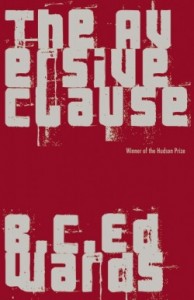 The Aversive Clause
The Aversive Clause
by B.C. Edwards
Black Lawrence Press, Feb 2013
176 pages / $16 Buy from Amazon or Black Lawrence Press
He lost me at:
St. Louis is a city entirely suburban, constructed and unnatural. Almost foreign after so many years in New York, and yet unmistakeably American. St. Louis is like watching a commercial for fast food.
I lived in St. Louis for four years, and it’s not that what B.C. Edwards is saying is not true. The city is made up of a bunch of sprawling residential pockets, peppered with soul-killing national chains and all the political tightness and hatred we’ve come to associate with middle America. It’s the way Edwards says it that makes me sad: as if St. Louis doesn’t even deserve a second look. As if he’s content to see it as a foreign planet, a place to visit for a while, and learn, and then return to New York City.
Of course, it’s the character talking here. Eli, from Brooklyn, whose entire growth cycle in “Bigger Than All These Buildings” relies on this dismissiveness. He flies to STL for his boyfriend David’s family reunion and for the length of it he is on the outside looking in, spiking the Kool-Aid and staying an arm’s length away from David’s aunts and their crucifixes. But a cathartic fight between brothers occurs, and in the end Eli suggests a visit to the St. Louis arch, the mythical and defunct Gateway to the West. “And they’re right,” he says. “All of them. It’s really something.”
The line is a satisfying ending to the story, on one level: not only does he cave in to the sightseeing all his boyfriend’s folks have recommended to him, but he also praises it with the kind of down-home phraseage that they’d probably described it with in the first place. It feels good. It feels indicative of emotional change. But on another level—and that’s in light of the rest of the story—the line feels a little patronizing to me. David’s family is still more or less nuts up to the end of the story, and salvation comes only after he’s left the thick of them. It’s almost too good, the ending, and maybe that’s because in a couple days Eli is going home.
It’s the same tone I sensed in much of the first part of The Aversive Clause. In the world of “Aggie with the Hat On,” “the streets rolled by, strip malls, neighborhoods, fast food, and the same again.” Aggie descends into a pathetic, drug-addled mid-American lifestyle until he encounters a surreal doppelganger. Milo in “Goldfish” drifts in and out of consciousness at a party after sexually assaulting his ex-girlfriend. Mattie and Zachs leave New York to rehab and turn over an old house and are forced to take on their own existential dilemmas when they find a giant iron statue of a cherry tree in the basement, left by the lonesome former resident.
July 15th, 2013 / 11:00 am
Pestilence by Jason Jordan
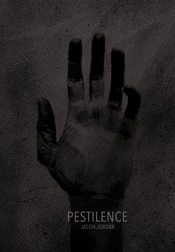 Pestilence
Pestilence
by Jason Jordan
Keyhole Press, 2013
58 Pages / $9.99 Buy from Keyhole Press
Strange situations infect the stories in Jason Jordan’s Pestilence and the unusual premise of each tale blends the surreal with everyday life in a disturbingly enchanting mix. In “Pestilence,” the eponymous story upon which the collection is titled, there is a new plague that visits a building every day of the week. Monday has corpses appearing randomly, then disappearing at midnight. Tuesday has hives of bees that swarm the residents. On Wednesday, they all need scuba gear as the entire building is flooded. The narrator invites a journalist to document the plagues that visit their house. He wants the anomalies within the building to be reported on, yet refrains from personal details about the inhabitants as he’s saving that information for the national media. While the reporter reacts with terror to what he witnesses, the residents are oddly indifferent. After the reporter endures two days of the plagues, he is ready to leave:
The pestilence becomes a decrepit bridge through which the narrator hopes to connect to the world. He is disappointed, then, when he finds out their house is misrepresented in the published article.
In similar form, the characters in the collection attempt to break the quarantine that separates them from everyone else. This is the second book by Jason Jordan I am reading and if there’s an aspect that ties his previous work, The Dying Horse, with Pestilence, it’s a chill attitude by the character in the face of horrors. In the case of “The House of Ice,” that’s a literal chill. The whole house is frozen along with the owner, Bill Jones, his dog, and even the cardinal. There is no explanation given for the freeze and after they are thawed, no one seems to care:
July 15th, 2013 / 11:00 am
When I Looked At Your Cock My Imagination Died
When I Looked At Your Cock My Imagination Died is the title of one of the sections in Ariana Reines’s collection of verse Mercury.
One nighttime, while considering all the boys I had heart-crushing crushes on (like you-know-who and yes-him and obviously-that-one-who-cares-if-he-did-what-he-did) I read this very section of poems for what may just be the one millionth and first time.
The first poem of this section is a letter (maybe it’s one of those electronic letters that all those 20-somethings in Brooklyn send back and forth or maybe it’s the type of letter that wonderful Willa Cather sent her eloquent girlfriend Edith Lewis).
“ariana,” commences the correspondence, “all I can think is the sex. Practice with the butt plug. Wear it around tonight. I want them to double penetrate you.” The boy talks about transferring money into Ariana’s account. He also dispenses further directions:
I want the video to start with you on the phone talking to me on your knees with their cocks touching your face and you looking up into the camera as you talk to me and begin sucking their cocks. When you start fucking I want to be on the speaker phone and jerking off. I want to see everything as they go in and out of you together.
The boy is quite tyrannical, and every worthwhile heart beats boisterously for tyrants, as there’s truth in being controlled and possessed. As the French boy who said 9/11 was symbolic points out, Western culture (i.e America and their ho bags) is nearly omnipresent, and the places where Western culture hasn’t grown its gay garbage — choice Muslim and black countries — there’s not likely to be many Western culture subjects (unless your name is Nicholas D. Kristof). Those who flaunt freedom aren’t free. They are dependents to the unpleasant pragmatic tyranny of America and its ho bags . If America and its ho bags was, perchance, destroyed, they’d be too. Jason Collins, to cite one dependent, wouldn’t be so if the hegemonic culture on earth gave zero craps about an average GLADD boy who can’t play basketball.
So, when Ariana surrenders her agency to this boy, she abandons phoniness as well. Stating that agency is an actuality is similar to stating that chocolate chip cookie dough is downright disgusting — it’s utterly untrue! A long time ago the Marxist boy Louis Althusser’s “moment of interpellation” brought out that bestowing identity is not the act of a single subject. More than one someone is required to be recognized as an entity. In Bodies That Matter, famous girl-boy Judith Butler put Louis’s interpellation in action. A policeman summons a citizen with a “Hey you!” The policeman heeds the “you.” He recognizes that the “you” is entwined with his world. The “you” may reply, but the “you’s” reply is due to the policeman’s summons. If the policeman didn’t say “Hey you!” then the citizen wouldn’t be impelled to speak to him — the citizen wouldn’t be able to utilize his voice. A creature can neither create an identity by his lonesome nor speak for himself on his own. Invariably, he must be recognized by someone not himself, even if that someone is a cuddly, invisible teddy bear.
All of that was completely necessary to convey so that I could confirm that Ariana is biding bon voyage to an idea of no value whatsoever. To sum up, agency is a tricky, corrupt instrument of American hegemony; and America, as Jewish novelist John Updike noted in the 60s, has lost the blessing of God. Ariana, though, has not. The poem proceeding the letter reads: “I want the gold. / Shimmer shimmer shimmer shimmer shimmer.” Since Ariana got to the truth, she shall get her gold too. Truth, says the sensational John Milton, is the foundation of Christianity. In the postlapsiarian planet, truth has been slashed into infinite tiny piece. The commendable Christian’s duty is to discover as many of these pieces as possible. All of this is why Ezekiel’s vision of New Jerusalem is “pure gold like clear glass.” God is there! Where God is, truth is; where truth is, gold (something of supreme value) is. By spotlighting the truth of subjection, Ariana aligns herself with God, truth, and gold.
Also in this section is another prose poem that begins “when i get on your cock like a bag my face is scarred”. Punctuation, paragraph breaks, capital letters — all of these components have been cast aside. Clauses collide into one another, like “i gaze up at the fat man to be reverential and durty none of us has hair i think i look confused so i wet my fat tongue i think exciting thoughts fake nails in clits fake nails in clits fake nails in clits.” First person pronouns are in the same caste as nouns, adjectives, and adverbs. The “i” isn’t capitalized: it’s been toppled (I believe capital letters aren’t pretty in the first place). An upheaval has happened and the words arrive at whiplash speed, like a flood, a plague — a circumstance from the best book ever, The Bible. Both are extreme, and that, according to me, is how things should be.



 But these lines don’t believe in themselves. Or do they? When Obama is elected, the poet is astounded because “it had nothing to do with politics or humanity or any of that shit, it was simply the fact that language did this.” Hope is the last word in the book, books. On the other hand:
But these lines don’t believe in themselves. Or do they? When Obama is elected, the poet is astounded because “it had nothing to do with politics or humanity or any of that shit, it was simply the fact that language did this.” Hope is the last word in the book, books. On the other hand: